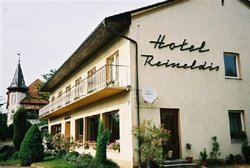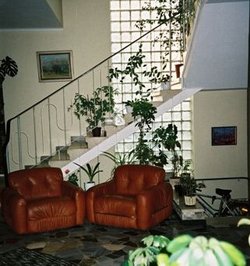Hotel
|
|
- This article discusses the residential establishment. For other uses of the term "hotel", see Hotel (disambiguation).
Missing image Castle.combe.hotel.arp.jpg The 4-star Manor House Hotel at Castle Combe, Wiltshire, England. Built in the fourteenth century, the hotel has 48 rooms and 365 acres (1.5 km²) of gardens. |
A hotel is an establishment that provides lodging, usually on a short-term basis. Hotels often provide a number of additional guest services such as a restaurant, a swimming pool or child care. Some hotels have conference services and encourage groups to hold conventions and meetings at their location.
| Contents |
Origins of the term
The word Hotel derives from the French hôtel, which originally referred to a French version of a townhouse, not a place offering accommodation (in contemporary usage, hôtel has the meaning of "hotel", and hôtel particulier is used for the old meaning). The French spelling (with the circumflex) was once also used in English, but is now rare. The circumflex replaces the 's' once preceding the 't' in the earlier hostel spelling, which over time received a new, but closely related meaning.
Hotels differ from motels in that most motels have drive-up, exterior entrances to the rooms, while hotels tend to have interior entrances to the rooms.
Services and facilities
Basic accommodation of a room with a bed, a cupboard, a small table and a washstand only has largely been replaced by rooms with en-suite bathrooms. Other features found may be a TV, a telephone and an alarm clock. Food and drink may be supplied by a small refrigerator (usually referred to as "mini-bar") containing snacks and drinks (to be paid for on departure), and tea and coffee making facilities (cups, spoons, an electric kettle and sachets containing instant coffee, tea bags, sugar, and creamer or milk).
However, in Japan the capsule hotel supplies minimal facilities and room space.
Origin of hotels from Sarai.
Classification
The cost and quality of hotels are usually indicative of the range and type of services available. Due to the enormous increase in tourism worldwide during the last decades of the 20th century, standards, especially those of smaller establishments, have improved considerably. For the sake of greater comparability, rating systems have been introduced, with the one to five stars classification being most common.
Boutique Hotels
“Boutique Hotel” is a term originating in North America to describe intimate, usually luxurious or quirky hotel environments. Boutique hotels differentiate themselves from larger chain or branded hotels by providing an exceptional and personalized level accommodation, services and facilities.
Typically boutique hotels are furnished in a themed, stylish and/or aspirational manner. Although usually considerably smaller than a mainstream hotel (ranging from 3 to 100 guest rooms) boutique hotels are fitted with telephony and wifi internet, air-conditioning, honesty bars and often cable/pay TV. Guest services are attended to by 24 hour hotel staff. Many boutique hotels have on site dining facilities, and the majority offer bars and lounges which may also be open to the general public.
Of the total travel market a small percentage are discerning travelers, who place a high importance on privacy, luxury and service delivery. As this market is typically corporate travelers, the market segment is referral rich, non seasonal, high yielding and repeat custom and therefore one which boutique hotel operators target as their primary source of income.
Hotels in fiction
Hotels have often been chosen by authors as the setting of their literary works. They are perfect for mysterious, anonymous settings where multiple characters may gather in equal positions. It is especially true of crime fiction, farces, and mysteries. Hotels also feature in films , television series, songs and even theme park rides.
Examples:
- Grand Hotel
- Room Service
- Plaza Suite
- The Hotel New Hampshire
- Fawlty Towers
- White Horse Inn
- Hotelier
- "Hotel California"
- Agatha Christie's Evil Under the Sun
- A Caribbean Mystery
- At Bertram's Hotel
- Cyril Hare's Suicide Excepted
- Hotel Rwanda
- "Hollywood Tower Hotel" (ride at Disney-MGM Studios, Orlando, Florida)
- The Overlook Hotel from The Shining
Other usage
In Australia, the word "hotel" often refers to a public house, a drinking establishment which does not necessarily provide accommodations. In India, the word may also refer to a restaurant, since earlier the best restaurants were always situated next to a good hotel.
See also
- List of famous hotels
- Hotel chain
- Motel
- Extended stay hotel
- Hotel bar
- Resort
- Hospitality services
- List of lodging types
- Tourism
- Hôtel de Ville
- Hilbert's paradox of the Grand Hotel (mathematics)da:Hotel
de:Hotel eo:Hotelo fr:Hôtel nl:Hotel id:Hotel ja:ホテル pt:Hotel fi:Hotelli


